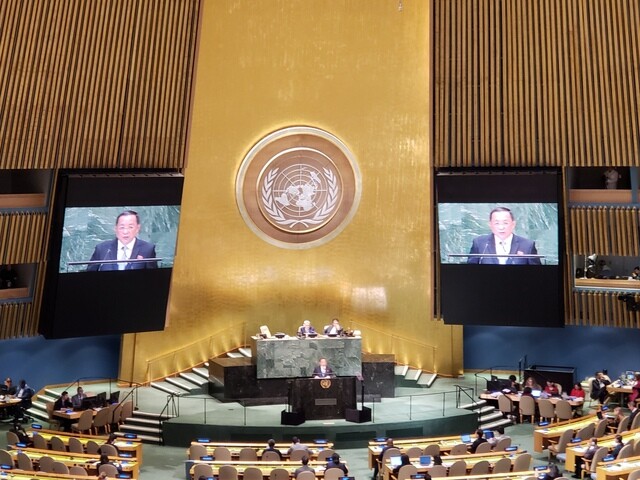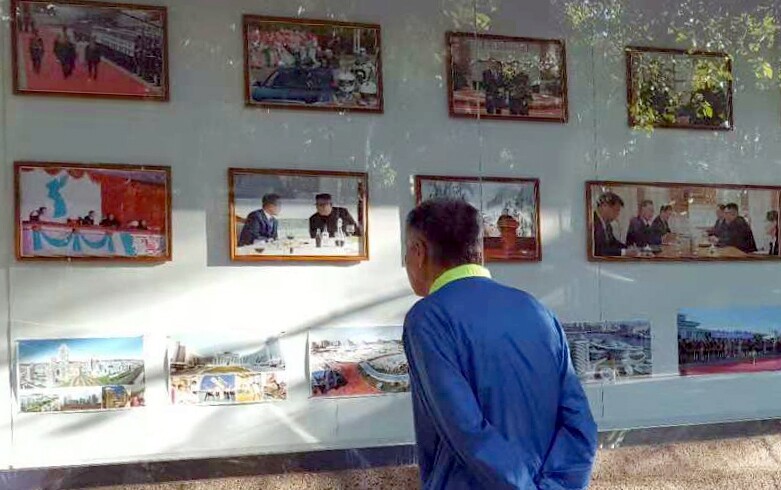hankyoreh
Links to other country sites 다른 나라 사이트 링크
[News analysis] Ri Yong-ho emphasizes “trust” and “peace” to UN General Assembly

The key words that turned up most often in North Korean Foreign Minister Ri Yong-ho’s keynote speech before the 73rd UN General Assembly on Sept. 29 were “trust” and “peace.” He also made frequent mention of the “economy,” “denuclearization,” and “sanctions.”
Encapsulated in the network formed by these five words was the focus of the North Korea’s international strategy as Ri sought to articulate it.
Lasting for 15 minutes and comprising a little over 1,100 words, Ri’s speech included 12 references to “trust” and five to “mistrust.” Together, they amounted to the same number of references – 17 – accorded to “peace.”
This suggests that trust between North Korea and the US holds roughly equal weight to peace on the Korean Peninsula in North Korea’s international strategy. Also notable is the fact that Ri mentioned “economy” or “economic” a total of seven times – the same number as his references to “denuclearization.”
To begin with, Ri mentioned the third plenary session of the seventh Workers’ Party of Korea (WPK) Central Committee on Apr. 20, where an end was declared to the “two-track” approach emphasizing the building of the economy and nuclear capabilities and a “new strategy course” was adopted with “all capabilities channeled into building a socialist economy.”
“The DPRK government's policy line of focusing on the economy requires [a] peaceful environment above anything else,” he said.
The position was identical to the one on the interrelationship between the economy and security expressed by China since its 1978 adoption of a policy approach focusing on reforms and openness. It’s also an argument North Korea had never expressed publicly prior to the Apr. 20 WPK plenary session. Particularly noteworthy from the international community’s standpoint is the message stressing the urgency of immediate peace for the sake of economic development.
Ri went on to say that the peninsula’s peace and stability hinge on “thoroughly implementing the DPRK-US Joint Statement” from June 12. Noting that the “DPRK government's commitment to thorough implementation of the DPRK-US Joint Statement is unwavering,” he added, “[W]e do not see any corresponding response from the U.S.”

Once again emphasizes necessity of corresponding US measures
“[T]he problem is that the continued sanctions are deepening our mistrust,” he said.
Ri also said, “It is our position that the denuclearization of the Korean peninsula should also be realized along with building [a] peace regime under the principle of simultaneous actions, step by step, starting with what we can do and giving priority to trust-building.”
His remarks reaffirmed Pyongyang’s official line calling for balanced, simultaneous, and step-by-step implementation of denuclearization and corresponding measures. Connected with this was his message position that there is “no way we [North Korea] will unilaterally disarm ourselves first” without “trust in the US” and “confidence in our national security.”
Ri’s remarks that “the denuclearization of the Korean Peninsula would not have come to such a deadlock” if “the party to this issue of denuclearization were [S]outh Korea and not the US” are noteworthy in this regard. This statement – unprecedented in the 70 years since Korea’s division – was read by observers as an expression of gratitude for South Korean President Moon Jae-in’s painstaking efforts to serve as a bridge for a second North Korea-US summit, as well as a message about US distrust toward North Korea.
Ri also made indirect mention of the chief corresponding measures that Pyongyang hopes to see. In his statement, he noted that the US “increases the level of pressure by sanctions to achieve their purpose in a coercive manner [. . .] even objecting [to] the ‘declaration of the end of war.’”
The reference to sanctions was seen as unusual, with no senior North Korean officials – including either leader Kim Jong-un or WPK Central Committee Vice Chairman Kim Yong-chol, who is in charge of negotiations with the US – having mentioned the word publicly since the North Korea-US summit on June 12.
At the same time, Ri avoided stating direct demands about what the US “must” do. Instead, he lamented, “The [UN Security Council] poured down on us numerous ‘sanctions resolutions’ making issue of our nuclear tests and rocket test launches. But even today, when one whole year has passed since such [nuclear and rocket] tests have been stopped, not even a word in those ‘resolutions’ has changed -- to say nothing about being totally removed or eased.” The remarks read as indirectly calling on the UNSC to pass a new resolution loosening or lifting its previous sanctions.
“Minister Ri’s speech stated the focus of North Korea’s international strategy and did not include any message directly attempting to influence the North Korea-US talks currently taking place behind the scenes,” observed a former senior South Korean official.
“Even the reference to sanctions shouldn’t be taken as insisting that they be lifted immediately,” the official said.
By Lee Je-hun, senior staff writer
Please direct comments or questions to [english@hani.co.kr]

Editorial・opinion
![[Column] Has Korea, too, crossed the Rubicon on China? [Column] Has Korea, too, crossed the Rubicon on China?](https://flexible.img.hani.co.kr/flexible/normal/500/300/imgdb/original/2024/0419/9317135153409185.jpg) [Column] Has Korea, too, crossed the Rubicon on China?
[Column] Has Korea, too, crossed the Rubicon on China?![[Correspondent’s column] In Japan’s alliance with US, echoes of its past alliances with UK [Correspondent’s column] In Japan’s alliance with US, echoes of its past alliances with UK](https://flexible.img.hani.co.kr/flexible/normal/500/300/imgdb/original/2024/0419/2317135166563519.jpg) [Correspondent’s column] In Japan’s alliance with US, echoes of its past alliances with UK
[Correspondent’s column] In Japan’s alliance with US, echoes of its past alliances with UK- [Editorial] Does Yoon think the Korean public is wrong?
- [Editorial] As it bolsters its alliance with US, Japan must be accountable for past
- [Guest essay] Amending the Constitution is Yoon’s key to leaving office in public’s good graces
- [Editorial] 10 years on, lessons of Sewol tragedy must never be forgotten
- [Column] A death blow to Korea’s prosecutor politics
- [Correspondent’s column] The US and the end of Japanese pacifism
- [Guest essay] How Korea turned its trainee doctors into monsters
- [Guest essay] As someone who helped forge Seoul-Moscow ties, their status today troubles me
Most viewed articles
- 1[Column] The clock is ticking for Korea’s first lady
- 2Samsung barricades office as unionized workers strike for better conditions
- 3[Editorial] When the choice is kids or career, Korea will never overcome birth rate woes
- 4[News analysis] After elections, prosecutorial reform will likely make legislative agenda
- 5S. Korea, Japan reaffirm commitment to strengthening trilateral ties with US
- 6All eyes on Xiaomi after it pulls off EV that Apple couldn’t
- 7After 2 months of delayed, denied medical care, Koreans worry worst may be yet to come
- 8US overtakes China as Korea’s top export market, prompting trade sanction jitters
- 9[Column] Has Korea, too, crossed the Rubicon on China?
- 10Hong Se-hwa, voice for tolerance whose memoir of exile touched a chord, dies at 76